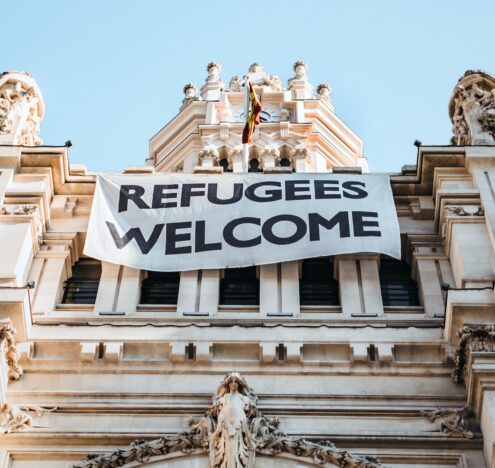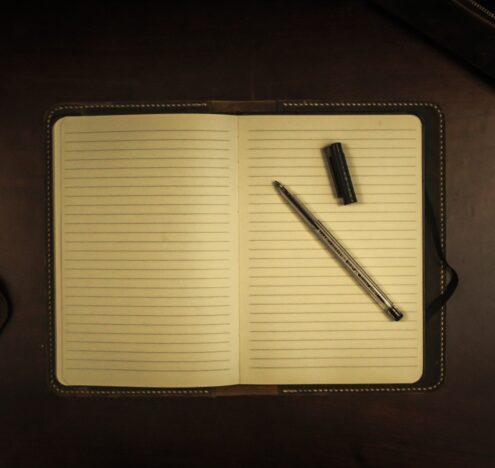A sliver of November skies utterly devoid of warmth shone through antiquated curtains. I could almost imagine the sun had never existed but for the bright, bone-colored clouds. Even this late in the year, the town in southern France was usually bathed in sunshine, its beige cobblestones warm to the touch, but today – nothing sang. It was as if the buildings themselves knew. In the stillness of the dusty room, my heartbeat reverberated off faded walls. Maybe, if I laid completely still, I could pretend last night’s election result was a twisted nightmare fueled by too many sweets before bed. But it wasn’t. It happened. Not knowing what to do next, I put pen to paper and wrote:
I’ve never felt tethered to any one place. Immigrants born of immigrants; we keep on moving. My maternal great grandparents escaped Hitler’s hatred, and my paternal grandparents fled Franco’s fist. We lived in multi-cultural Venezuela until my parents took my brother and I to the United States in ’97. One year later, the administration that would lead Venezuela on its downward spiral took over. Without meaning to, we had fled corruption once more. Still, when I left the United States this year and moved 3,000 miles away, I never thought politics might make that move permanent.
The ability to relocate has been passed down to me like an heirloom. Despite this, America is one of my countries. Nineteen of my twenty-two years were nurtured upon that soil. In Tropical South Florida, I learned how to drive too fast, kiss awkwardly, and calculate the exact amount of ice cream necessary to reboot a broken heart. In Boston, where I went to university, I balanced multiple jobs and skipped way too much class in favor of shifts. America is my country.
Today, I woke up sad. Sad for my country. My eyelids fluttered open and instantly I remembered. It was as if a thousand stones had been plopped on my chest, plunging me deeper into the mattress. For years I’ve grieved Venezuela, my birthplace ravished by political corruption, now the mourning doubles.
Throughout my childhood, south Florida was a shelter. In these beach and swamp-front towns, minorities are the majority and white supremacy is overshadowed by loud music and boisterous laughter. Our tongues wrap themselves around languages and dishes rich in flavor; our matching life stories, dark eyes, and hair created a bubble of uniformity and acceptance. As I got older, that illusion shattered. I began to feel the tremble emanating from our racist faults. I began to feel the warning signs. Still, and perhaps naively so, I expected more from The Land of The Free.
Our bias runs deep. We camouflage ourselves in words, claiming: ‘We Are All Created Equal’. We wore the mask of a modern, educated, all-accepting Nation. But the mask is made of cotton, and as it thins and tears from wear, we see the truth. The truth revealed to the whole world on November 9, 2016.
Today I woke up sad. Sad for my country.
This was three years ago. I am still an expat and physical distance protects me from the worst sides of our cultural toxicity, but this does not mean I breathe easy. Like a Moscow- based nuclear physicist, I know: if the radiation is not stopped, it will disseminate and poison everything far beyond Pripyat and Chernobyl. Hatred is the same way – invisible until it’s not. Until it’s the only thing you can see, feel, and breathe. Already too much of this poison is circulating within and beyond our borders.
It infiltrated France in 2017 when Marine Le-Pen was emboldened by Trump’s victory, earning her the moniker “France’s Trump.” They are shockingly similar. Both of their campaigns were defined by anti-immigrant rhetoric, anti-Semitism, islamophobia, and inappropriate, violently aggressive tweets. Upon her defeat, it felt as if the entire western world exhaled in relief — I too relaxed my shoulders. Still, alt-right activity in Europe has escalated in the past three years: the refugee crisis mixed peoples of divergent cultures in tight proximity, and since we are often afraid of what we don’t understand, that ignorance begot feelings of insecurity. The alt-right sensed and preyed upon this fear, seeking to breed hatred from our differences. In Germany, the AfD (Alternative for Germany), a party whose leaders have marched alongside neo-Nazis, won seats in the federal parliament for the first time ever in 2017 and pledged their allegiance to Trump.
Fortunately, Europeans have been fighting in favor of unity. In October of 2018, I set out for a walk on a sunny autumn day in Berlin and found myself in the trenches of one of Germany’s biggest protests. Hundreds of thousands of people were there supporting the European Union, refugees, LGBTQ rights, and the environment. As I later learned, the event was a countermeasure to the alt-right’s resurgence, employing #unteilbar (indivisible), as its key message. And that’s what you felt: a mass of people indivisible in their striving for acceptance and respect.
These progressive politics continue to prove their widespread appeal. Throughout Europe this year, the Green Party won more seats in parliament than ever before, acquiring several votes even in conservative Switzerland. Every Friday, masses of children activists protest just ten minutes away from my office as part of the #FridaysforFuture movement. It reminds me that a twelve-year-old can have a better sense of wisdom and responsibility than politicians several times their age and size. Living here, I’ve been witness to the very real strides being taken to build a rhetoric and reality without hatred as headliner. I hope American voters can echo the European populace in 2020 and actively push back against the hate politics threatening to take over the world.
Elissa Gonzalez is a Venezuelan-American copywriter living in Germany.





















